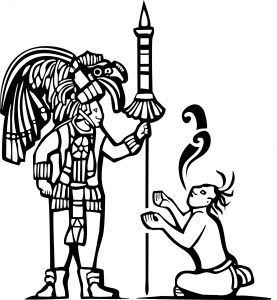The Toltecs, known as “men and women of wisdom”, lived thousands of years ago in southern Mexico.
Despite being identified by anthropologists as a nation or race, the author of the book 'The four commitments – the book of Toltec philosophy', Don Miguel Ruiz, refers to them as “scientists and artists who have joined together to explore and conserve the spiritual wisdom and the practices of the ancients”.
According to Don Miguel, men and women lived as masters (or naguals) and apprentices in Teotihuacan, the ancient city of the pyramids, near Mexico City, but over the millennia they were forced to hide and maintain their existence in secrecy due to to the European conquest and the misuse of the power of some students.
In this book, Don Miguel presents himself as a nagual and points out four commitments of Toltec philosophy that allow us to live in a much fuller, more conscious and healthier way.
I will introduce each one of them so that we can learn a little from the knowledge of the “nagual”.
The 1st commitment – be impeccable with your word

What does the word “impeccable” mean? According to the author, impeccable comes from the Latin peccatu and means “sin”. The prefix im is equal to “without”, so impeccable could be translated as “sinless”.
Despite knowing that religions talk about sin and sinners, the author presents us with a new understanding of this word.
For him, sin is everything we do against ourselves. Every time we feel, believe or say something against ourselves, we are committing a sin, and whenever we blame or judge ourselves, we are also committing a sin.
Sin begins when we reject ourselves. THE self-rejection it would therefore be the greatest of all sins.
And how can we be impeccable with our word?
When we don't use it against ourselves.
And why the word?
Because, according to the author, it is the power we have to create, the gift that comes directly from God. It is through her that we express our creative power, that we manifest everything that occurs in our lives. The word is the force and it is through it that we have the power to express ourselves, to communicate and to think.
When we are impeccable with our word, we do not go against our nature. We take responsibility for our actions, without judgment or blame.
For the author, many people produce “poison” through their thoughts. They live so dissatisfied and so “contaminated” internally, that their words are the way to get rid of some of this poison. They then gossip and speak ill of other people as a way of getting rid of this poison that their own mind produces.Being impeccable with your word requires, therefore, that we control our thoughts so that they do not produce the poison that we will then need to release through gossip or what the author calls “enchantments”.
Incantations are phrases that we often say carelessly to other people and that, when heard, end up determining their lives. For example, when the stressed mother tells her daughter that she was singing what a horrible voice her voice was. From that moment on, the daughter is “enchanted” and never has the courage to sing again.
How many "spells" have we cast on the people we love for not being impeccable with our words? How much poison have we already distributed for not taking care of what we think?
According to the author, if we adopt this practice and become impeccable with our word, “any emotional poison will be cleansed from our mind and from all communication in our personal relationships”.
And when we use our word to spread love, mostly repeating ourselves loving phrases, we break spells made, clean our mind of poisonous thoughts and achieve freedom, success and abundance.
Maybe we never thought about the power that words have in our lives. But for a nagual this is the first and most important commitment among the four of us to live a fuller and happier life. And given the difficulty of being impeccable on a daily basis with what we think and say, I believe he is right.
Soon, I will also present the second commitment of Toltec philosophy. Wait!

























